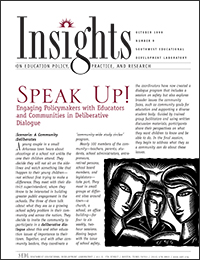Conclusion
Initiating a deliberative dialogue effort may not be the solution for every community wrestling with an issue. To plan and implement it successfully will require work, time, resources, and especially the willingness and enthusiasm of the people involved. For it to be a uniquely valuable experience, participants will need to explore the topic they discuss at a deeper level than they usually do and with others whose perspectives significantly differ from their own.
Implemented successfully, a deliberative dialogue program on education can help bring educators, policymakers, and members of the general public together with a common goal of ensuring that children receive the best education possible. Deliberative dialogue may be the key to breaking existing adversarial or passive traditions of dealing with difficult education topics. From the dialogue, participants may find themselves developing new relationships and perspectives, and they may approach problem solving with a new enthusiasm and eagerness to get involved with the education of their young people.
Next Page: References & Credits

